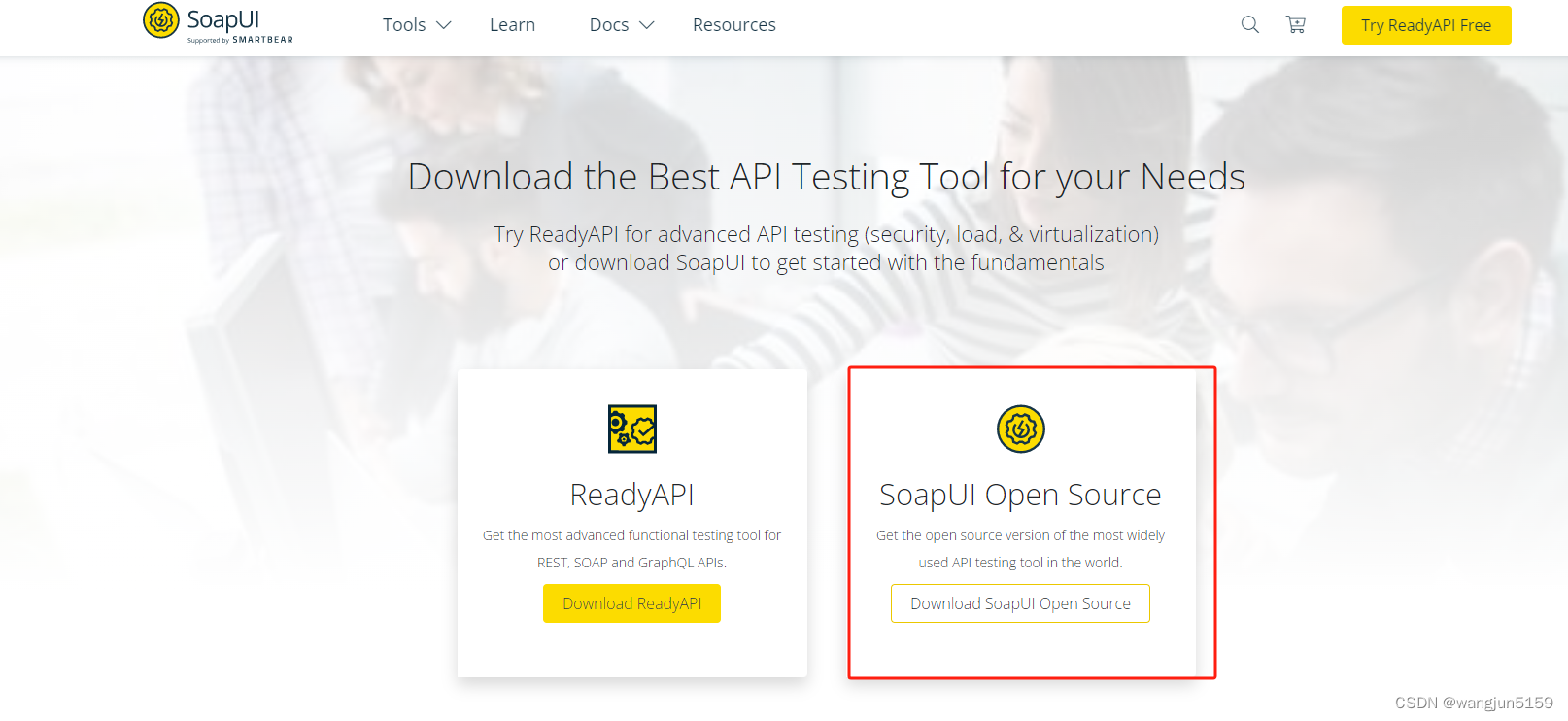前言
本文主要介绍通过wsdl文件生成java客户端代码以及webservice的可视化测试工具SoapUI;以及解决遇到的乱码问题。
背景
最近要对接HIS系统,对方提供的接口是webservice(这种技术,有点古老),提供了wsdl文件,我方需要根据wsdl文件生成java代码,intellij idea生成webservice客户端代码支持的不是很好,研究得知,可通过wsimport命令来生成,
- wsimport 根据wsdl文件生成java代码;
- wsgen 根据endpoint implementation class生成必要的文件,包括但不限于wsdl文件。
这两个命令在
%JAVA_HOME%\bin
下。
根据wsdl生成java代码
wsimport -encoding utf8 -p 包名 -wsdllocation http://somedomain/some/path/some.wsdl wsdl文件路径
- -encoding,指定生成的java文件的编码
- -p,指定生成的java包名
- -wsdllocation,指定生成的java中wsdl的路径
- wsdl文件路径,通常会将wsdl保存为本地文件
注意的点
@WebServiceClient的类
生成后的文件,先找到一个注解有javax.xml.ws.WebServiceClient的类,这个类对应着wsdl文件中的service元素;
<definitions name=""
xmlns="http://schemas.xmlsoap.org/wsdl/">
<service name="service_name">
</service>
上述xml使用了默认namespace,如果写全,则是
<wsdl:definitions xmlns:wsdl="http://schemas.xmlsoap.org/wsdl/" >
<wsdl:service name="service_name">
</wsdl:service>
以下同理,不再赘述。
这个类通常指定了wsdl的位置及namespaceURI,
import javax.xml.ws.Service;
/**
*
* 通常会有如下注释以表明是自动生成
* This class was generated by the JAX-WS RI.
* JAX-WS RI 2.2.9-b130926.1035
* Generated source version: 2.2
*
*/
@WebServiceClient(name = "SomeService", targetNamespace = "http://some.domain", wsdlLocation = "http://domain.com/path/some.wsdl")
public class SomeService
extends Service
{
private final static URL PREFIX_WSDL_LOCATION;
static {
URL url = null;
WebServiceException e = null;
try {
//这里是WSDL文件的地址,真正的通信地址在soap:address元素的location属性中
url = new URL("http://domain.com/path/some.wsdl");
} catch (MalformedURLException ex) {
e = new WebServiceException(ex);
}
PREFIX_WSDL_LOCATION= url;
}
}
@WebService的类
找到注解有 javax.jws.WebService的类,这个类对应着wsdl文件中的portType元素。
<portType name="SomePortType">
<operation name="operation_name">
<documentation>Service definition of function ns__operation_name</documentation>
<input message="输入参数"/>
<output message="输出参数"/>
</operation>
</portType>
这个类中通常会定义了很多方法,
@WebService(name = "SomePortType", targetNamespace = "http://some.domain")
@XmlSeeAlso({
com.package.ObjectFactory.class
})
public interface SomePortType {
@WebMethod(operationName = "someOperation")
@WebResult(name = "someResult", targetNamespace = "")
//省略
public String someOperation(
@WebParam(name = "输入参数1", targetNamespace = "")
String someInput,
@WebParam(name = "输入参数2", targetNamespace = "")
String someInput2);
ObjectFactory
还有一个ObjectFactory类,但
import javax.xml.bind.annotation.XmlRegistry;
@XmlRegistry
public class ObjectFactory {}
基本用法
注解有WebServiceClient的类 someService = new 注解有WebServiceClient的类;
final SomePortType somePortType = someService.getSome();
final String 输出参数 = somePortType.目标方法(输入参数)
好用的SOAP ui测试工具
我们先直观的感受下wsdl文件,wsdl文件用来描述一个webservice提供了哪些服务;比如天气webservice,
http://www.webxml.com.cn/WebServices/WeatherWebService.asmx?wsdl
,浏览器中打开如下
最重要的是
wsdl:service
节点,提供了4个端口,2个webservice(SoapUI中创建SOAP project可以看到)、2个http的(SoapUI中创建rest project可以看到)。
soap:address
元素中的location属性才是真正的服务地址。
<wsdl:service name="WeatherWebService">
<wsdl:documentation xmlns:wsdl="http://schemas.xmlsoap.org/wsdl/">.....</wsdl:documentation>
<wsdl:port name="WeatherWebServiceSoap" binding="tns:WeatherWebServiceSoap">
<soap:address location="http://www.webxml.com.cn/WebServices/WeatherWebService.asmx"/>
</wsdl:port>
<wsdl:port name="WeatherWebServiceSoap12" binding="tns:WeatherWebServiceSoap12">
<soap12:address location="http://www.webxml.com.cn/WebServices/WeatherWebService.asmx"/>
</wsdl:port>
<wsdl:port name="WeatherWebServiceHttpGet" binding="tns:WeatherWebServiceHttpGet">
<http:address location="http://www.webxml.com.cn/WebServices/WeatherWebService.asmx"/>
</wsdl:port>
<wsdl:port name="WeatherWebServiceHttpPost" binding="tns:WeatherWebServiceHttpPost">
<http:address location="http://www.webxml.com.cn/WebServices/WeatherWebService.asmx"/>
</wsdl:port>
</wsdl:service>
就像postman是http的ui客户端,SoapUI是web service的ui客户端,用来测试非常方便,注意下载开源版。
新建SOAP project,输入wsdl地址,
http://www.webxml.com.cn/WebServices/WeatherWebService.asmx?wsdl
,
点击绿色左右箭头,能看到定义服务的URI和SOAP版本等信息,WeatherWebServiceSoap是SOAP 1.1版本,WeatherWebServiceSoap12是SOAP 1.2版本。
双击Request 1,点击绿色箭头就可以执行了,右侧是执行结果。
webservice仍然是使用的http来通信的,只是发送的内容遵循SOAP格式要求,这一点可通过http log查看。
http的请求体,请求体都封装在Envelope元素内,包含header和body两部分;
<soapenv:Envelope xmlns:soapenv="http://schemas.xmlsoap.org/soap/envelope/" xmlns:web="http://WebXml.com.cn/">
<soapenv:Header/>
<soapenv:Body>
<web:getSupportCity>
<!--Optional:-->
<web:byProvinceName>?</web:byProvinceName>
</web:getSupportCity>
</soapenv:Body>
</soapenv:Envelope>
http响应体,响应也是封装在Envelope元素内,包含header和body两部分;
<?xml version="1.0" encoding="utf-8"?>
<soap:envelope
xmlns:soap="http://schemas.xmlsoap.org/soap/envelope/"
xmlns:xsi="http://www.w3.org/2001/XMLSchema-instance"
xmlns:xsd="http://www.w3.org/2001/XMLSchema">
<soap:body>
<getsupportcityresponse
xmlns="http://WebXml.com.cn/">
<getsupportcityresult>
<string>........</string>
</getsupportcityresult>
</getsupportcityresponse>
</soap:body>
</soap:envelope>
问题
在用java调用ASP.Net提供的webservice时,遇到了中文全部乱码、英文字母和数字正常的问题,可能是我方在处理响应时,使用的
ISO_8859_1
解码的字节流,因为
ISO_8859_1
只有字母、数字,没有汉字,符合中文全部乱码、英文字母和数字正常这个现象;将已经乱码的字符串使用
ISO_8859_1
编码为乱码前的字节流,然后再使用
UTF_8
解码就好了。从中可以推断,接收到的字节流是utf8编码的,只是在字节流转字符串时使用了错误的编码解码导致了乱码。
import java.nio.charset.StandardCharsets;
/**
* webservice 返回的编码是iso-8859-1,需要转换成utf-8
* @param str
* @return
*/
private static String convertEncode(String str){
return new String(str.getBytes(StandardCharsets.ISO_8859_1), StandardCharsets.UTF_8);
}
在解决上述问题时,看到了汉字奇数位乱码相关的帖子,经参考最后一个奇数汉字出现乱码解决方案、关于Java奇数最后一个字符输出乱码问题,懂了问题产生的原因
final byte[] utf8s = "你好啊".getBytes("utf8");
final String gbk = new String(utf8s, "gbk");
System.out.println(gbk);
final byte[] gbks = gbk.getBytes("gbk");
for (byte utf8 : utf8s) {
//输出十六进制
System.out.printf("%02X ", utf8);
}
System.out.println();
for (byte gbkEle : gbks) {
System.out.printf("%02X ", gbkEle);
}
System.out.println()
System.out.print(new String(gbks, "utf8"));
最后一个字节发生变化,变为3F
浣犲ソ鍟�
E4 BD A0 E5 A5 BD E5 95 8A
E4 BD A0 E5 A5 BD E5 95 3F
你好�?
当“你好啊”替换为“一二三”时,结果如下,第3个字节变为3F
涓�浜屼笁
E4 B8 80 E4 BA 8C E4 B8 89
E4 B8 3F E4 BA 8C E4 B8 89
�?二三
也就是说,utf8字节流以gbk(通常将2个字节作为一个汉字处理)解码为字符串时,因为编解码差异会导致有些字符找不到,然后就会被替换为问号(ascii字符集的3F),字节流已经发生变化,再以utf8解码时(utf8中,通常3个字节当作1个汉字处理),就产生了乱码。
总结
参考过java对接webservice接口的4种方式总结,个人觉得还是使用wsimport生成java客户端的方式比较简单,不需要添加依赖,而且是面向java编程;使用httpclient发送SOAP消息体倒是简单直接,就是需要拼接xml有点繁琐。
版权归原作者 wangjun5159 所有, 如有侵权,请联系我们删除。